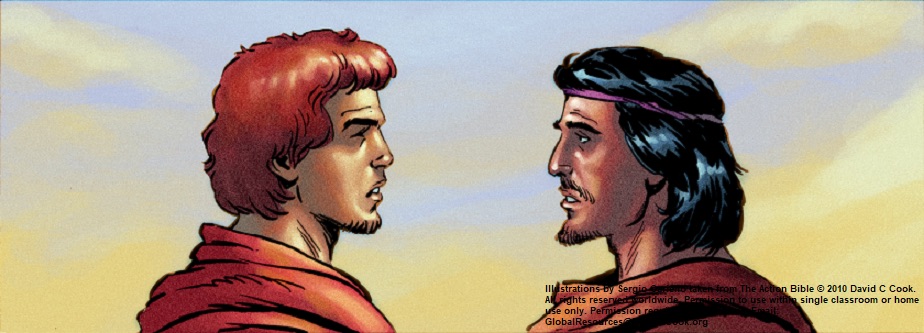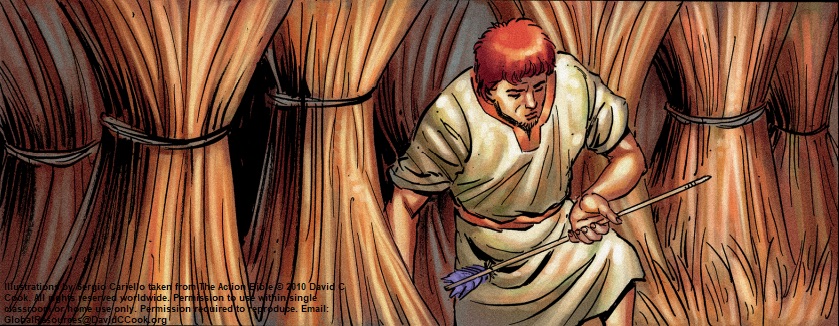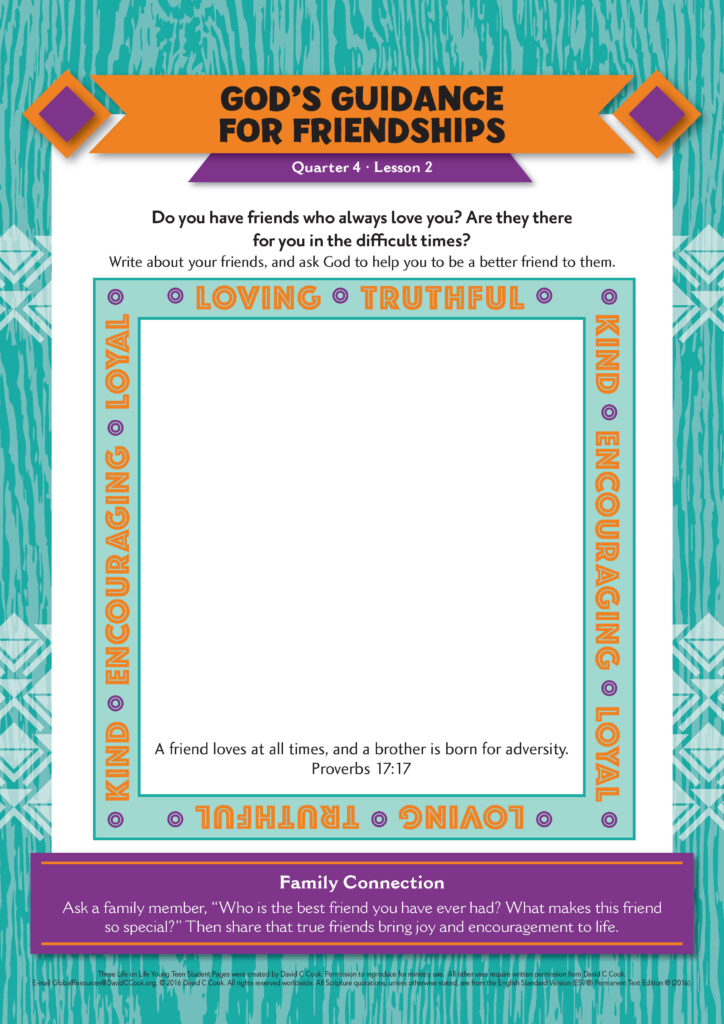During the lesson, the information for you to know is written in regular type, and what we suggest speaking or reading aloud to children is in bold. All resources for this lesson, including the Teacher Guide, Student Page, Family Connection Card, and other resources can be downloaded in a ZIP file by clicking on the following link:
In some lessons you will find "resource articles." These are articles written by experts from around the world to help equip you for your work with children and adolescents. Share them with parents or guardians if you consider it appropriate.
Greater love has no one than this: to lay down one’s life for one’s friends.
John 15:13
At times, we all need the love of a true friend. We need the support of someone who cares and understands. After all, a true friend loves you at all times. A true friend “sticks closer than a brother” (Proverbs 18:24). Do you have a friend like that? Someone who loves and prays for you in your difficulties? Someone who brings out the best in you? Someone whose friendship with you brings glory to God?
True friends are gifts from God. When we rely on Him to lead us in our friendships, we often experience the caring relationships we truly desire. But even the friends God brings into our lives will disappoint and hurt us. However, there is a Friend who will never leave you or forsake you. He is with you always. He laid down His life for you! How can you be a friend to Him? And how can you allow His friendship to change your life? Pray that Jesus, a true Friend, whose love is beyond compare, will bring the warmth of His friendship to you and the teens in your group in a very real and lasting way.
Encourage the students to ask their family members, “Who is the best friend you have ever had? What made this friend so special?”The students can then share that true friends bring joy and encouragement to life.
Teacher Tip: If possible, email or text the Family Connection Card to the families of your students.
As the teens arrive, ask them about their friends. Who are their closest friends? Who do they most enjoy spending time with? What makes someone a good friend?
Gather the class together to begin the discussion.
Which of these characteristics do you think is most important? Do not say it out loud! Now you will try to find others who think the same characteristic is the most important in a friend.
Walk around the teaching area and talk to other students. You cannot make statements, and you cannot say your characteristic out loud. You can only ask and answer questions. Your goal is find others who think the same characteristic is most important.
For example, if I think a good sense of humour is the most important characteristic in a friend, I might ask, “Do you like to laugh?” If the other person says something like “Who likes laughing?” you know you will have to keep looking for others who thinks a good sense of humour is the most important characteristic. If the other person agrees by saying something like “How can I have fun without laughing?” then both of you should continue together looking for others who think a good sense of humour is the most important characteristic in a friend.
Allow 3–5 minutes for this activity. If the students are having trouble, help them with questions they can ask. By the end, most of the students should be in a few larger groups. Count the students to identify the largest group. Ask a member of the group what their characteristic was.
Allow the remaining groups to share their characteristics.
All of these are important characteristics in friends. Choosing friends like these can help you to have better friendships. But what about when you choose friends who do not have these same traits?
We can choose good or bad friends in life. Good friends build us up. They support us, help us, and encourage us. They allow us to become the very best version of ourselves. Bad friends persuade us to do things that are against our character or our values. They push us to become people we do not want to be. So how do you know which type of friends you have? Let’s hear about a very good friendship and how God used these friends to bring glory to Him.
The Bible tells us the story about 2 friends, David and Jonathan, whose friendship made both of them the best they could be. In the story of Jonathan and David, listen for things that they did for each other to show they were true friends, such as showing love, loyalty, protection, and kindness. When you hear something that shows true friendship, you will make a sign.
Allow students to create a hand sign to use for the lesson. If appropriate, you can teach them a sign from your culture.
David was a young shepherd. God chose David to be the future king of Israel. It was tradition for the king’s oldest son to become the next king. David was not the son of a king, but God chose him to become the next king anyway. King Saul’s son was Jonathan. If God had not chosen David, Jonathan would have been the next king.
Students may answer that they would have felt jealous or angry or that they would have hated David for taking their place.
Students may answer that he would have loved David anyway, in spite of the fact that David was going to take his place as king.
When David began to serve King Saul, he met Jonathan. Right away they became close friends.
Ask a student to read 1 Samuel 18:3–4 aloud from the Bible.
And Jonathan made a covenant with David because he loved him as himself. Jonathan took off the robe he was wearing and gave it to David, along with his tunic, and even his sword, his bow and his belt.
1 Samuel 18:3–4
He loved David like a brother and gave him his robe, tunic, and weapons.
Self-sacrifice, generosity, love.
Though Jonathan loved David, King Saul did not. He was jealous of David because David was a great warrior and the people of Israel loved him more than Saul.
Ask a student to read 1 Samuel 19:1–4, 6 aloud from the Bible.
Saul told his son Jonathan and all the attendants to kill David. But Jonathan had taken a great liking to David and warned him, “My father Saul is looking for a chance to kill you. Be on your guard tomorrow morning; go into hiding and stay there. I will go out and stand with my father in the field where you are. I’ll speak to him about you and will tell you what I find out.” Jonathan spoke well of David to Saul his father and said to him, “Let not the king do wrong to his servant David; he has not wronged you, and what he has done has benefited you greatly…. Saul listened to Jonathan and took this oath: “As surely as the Lord lives, David will not be put to death.”
1 Samuel 19:1–4, 6
If possible, show the students the images from The Action Bible.


Students may answer that Jonathan protected David, was truthful with him, and saved his life.
Students may answer that he was loyal and honest.
Time went by, and King Saul continued to be jealous of David. Again, Saul wanted to kill David. And again Jonathan warned David of his father’s plan. Jonathan comforted and encouraged David. He also sent David away so David would be safe from Saul’s anger. Before David left, he and Jonathan met to say good-bye.
Ask a student to read 1 Samuel 20:42 aloud from the Bible.
Jonathan said to David, “Go in peace, for we have sworn friendship with each other in the name of the Lord, saying, ‘The Lord is witness between you and me, and between your descendants and my descendants forever.’”
1 Samuel 20:42
Students may answer that he saved David again and that he committed to be a good friend to David forever.
Students may answer that he was loyal and that he was a godly friend who made a commitment before the Lord.
David and Jonathan had a true friendship of kindness, sacrifice, honesty, and love. Their friendship bound their families together forever. Even after Jonathan was dead, David took care of Jonathan’s son because of his friendship with Jonathan. Because of their love and sacrifice for one another, David and Jonathan’s friendship brought honour to God.
Jonathan chose to love David rather than to be jealous of him. Jonathan protected David by warning him and by trying to change Saul’s mind.
The Bible gives us lots of guidance when it comes to friendship. The advice we find in God’s Word can help us to choose our friends wisely. Listen to how the Bible explains friendship.
Show the Memory Verse poster, if you are using it.
A friend loves at all times, and a brother is born for a time of adversity.
Proverbs 17:17

A true friend can bring us comfort and encouragement during hard times. A good friend loves us even when we make mistakes. A loyal friend—like a loyal brother or sister—should always help in a time of trouble.
Jonathan was a true friend to David. But not all friends are like Jonathan. Some are more like Saul—they claim to be friends but actually do not want the best for you. Some may even try to cause you harm or pressure you to make decisions that will be bad for you.
Ask a student to read Proverbs 13:20 aloud from the Bible.
Walk with the wise and become wise, for a companion of fools suffers harm.
Proverbs 13:20
Students may answer that good friends will make us wise and help us to make good decisions, but bad friends will lead us to make poor choices.
Allow 4–5 students to share their answers. Then ask each of those who responded to answer the next question also.
What seems important is not necessarily what is truly most important in a friendship. Having common interests or finding someone you enjoy spending time with is important. These things help draw you together. But true friendship can bring so much more to our lives.
Ask the students to choose partners. Boys should be partnered with boys and girls with girls.
I will read a list of characteristics the Bible tells us are important in friends. As I read each one, show this kind of friendship to your partners. For example, when I say, “A true friend is kind,” I would like you to smile at your partner or do something else that shows kindness.
Read the following list aloud, and allow 10 seconds after each item for the students to act out the characteristic. When you have completed the list, you can add your own or ask your students for suggestions. There are some suggestions for student actions included in parentheses after each statement.
Did you notice that most of you smiled when you were showing the characteristics of a good friend? Why do you think you did that?
True friends bring joy to our lives! God has given us the gift of friendship—and true friends are truly gifts! They love us always, they encourage and support us when we need them, and they help us to become the best we can be.
Think about your friends. When I ask you these questions about them, you do not need to answer aloud. Instead, just think about your answers—and you can pray, if you would like, to ask for God’s guidance in your friendships.
When you need guidance in a friendship, there is someone you can always rely on for wise advice. The Bible is the source of truth about all things—including friendship. The Bible tells us that Jesus loves us so much that He died for us. He is the best Friend you can ever have. If you follow His example and His guidance, you can begin to give and receive true friendship—the kind that brings joy, love, and encouragement to your life.
Optional: Pass out the teens’ prayer journals from last week. Ask them to open to a blank page in their journals. Set out extra paper for any teens who have not yet made prayer journals. Show them how to fold 2–3 pieces of paper in half, like a book, and staple them together. Give the students 4–5 minutes to write or draw about their friendships in their journals. Ask the questions above to guide their thoughts.
If you are using the Student Pages, the students can write their thoughts on the pages.

Optional: As you close in prayer, have teens place their hands on their journals or their Student Pages to show that they are choosing God’s guidance for their friendships. Collect the journals to use again in the next class.
Close with a blessing based on Ecclesiastes 4:9–10.
Blessing: May you have the kind of friends who lift you up when you fall down. May God guide you to true friendship that will bring joy and encouragement to your life and glory to Him. May all of your friendships be guided by God, who created and delights in friendship.
Lead the teens in singing this quarter’s song if possible.
Life on Life ©2020 David C Cook. Reproducible for home or classroom use only. All other uses require written permission from David C Cook [email protected]. All rights reserved.